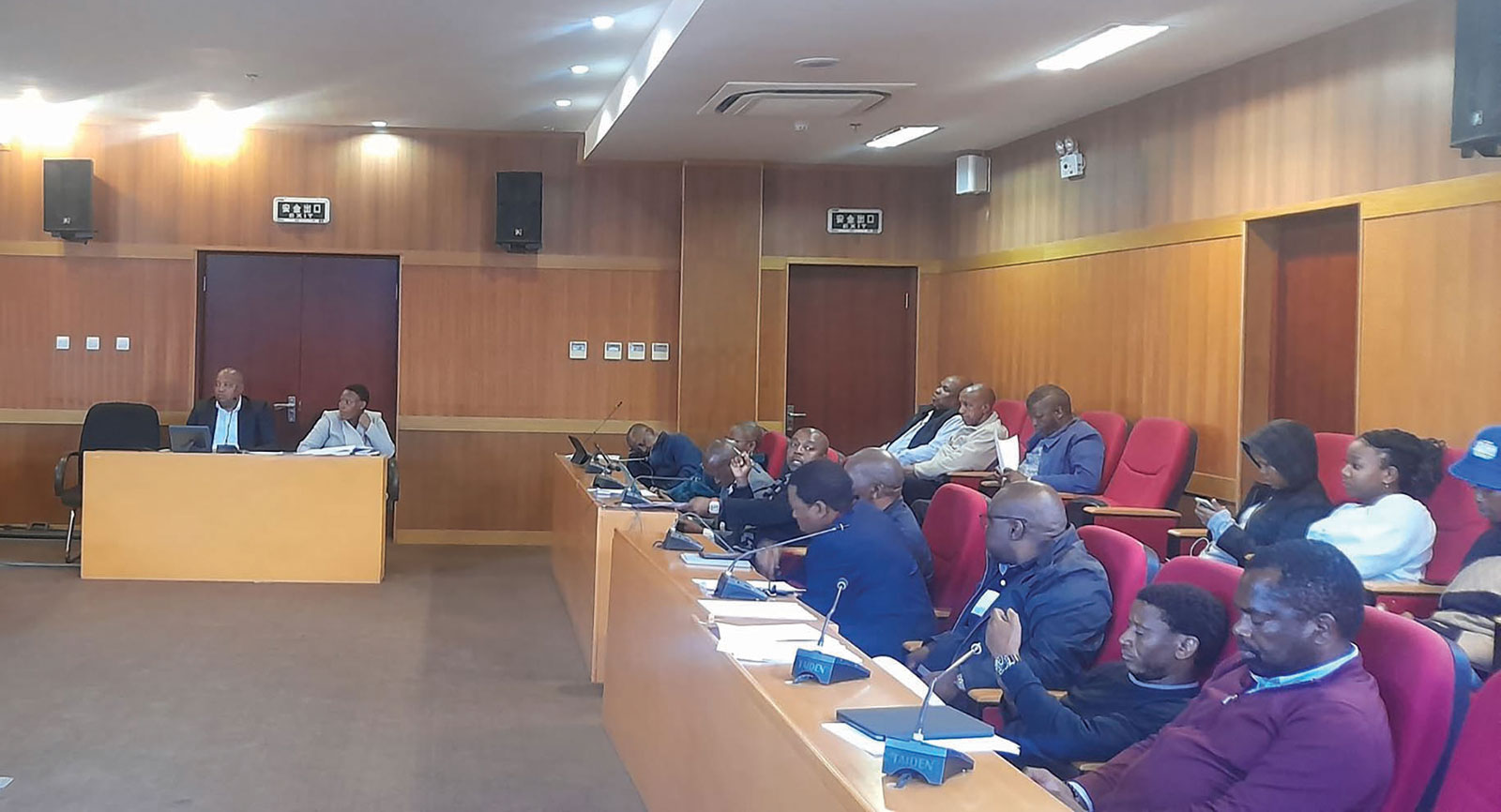Job losses loom at local factory?

SHARE THIS PAGE!
By Neo Kolane
Workers at local textile factory Lesotho Precious Garments are facing an uncertain future following a revelation that an undisclosed number of the workers are to be retrenched beginning this year. And the announcement has clearly ruffled feathers.
Already, the workers have been warned of an impending retrenchment which is prompted by an array of both local and global events.
The chilling revelation is contained in a letter communicated to the textile and leather workforce trade union Independent Democratic Unions of Lesotho (IDUL)
In this two-page letter to IDUL dated January 11 2023 the management of Lesotho Precious Garments informs trade union of an ongoing economic meltdown affecting both African and Asian countries.
The management wrote that the economic meltdown, which it dubbed a crisis “was precipitated by ongoing war between Russia and Ukraine and other factors that are beyond the control of the company, the operations of the company are going to be negatively affected.”
In an interview with theReporter this week, the regional manager of Lesotho Precious Garments Lengana Tṧepe said a glimpse of job shortages was observed during the just ended festive season where workers were engaged to do special and urgent orders that were sent back home earlier than the agreed timeframe. He said there are signs that more and more of such incidents will hound the factory again.
Tṧepe said there are proposals that are to be considered such as voluntary resignations aimed at securing long services packages.
“Another proposed consideration is that further and more proposals will be made as the year starts and extensive consultations will further be made with all who will be affected,” he said.
According to the Lesotho National Development Corporation’s (LNDC) Industry Status Report dated March 2021 at least 6064 workers in the clothing and textile sector lost their jobs due to the COVID-19 induced economic meltdown.
The report shows that between the period of March 2020 to March 2021 factory closures and downsizing immensely contributed towards the sacking.
“Two factories namely, Coating Company and Huan Sheng ceased operations while Presitex and CGM merged. Nien Hsing International combined its five companies into three and is planning to combine the three companies into one,” the report. Read.
The report further notes that lack of demand on the market led to the layoff of factory workers.
“Another contributing factor to employment is the decline in purchase orders as a result of the Covid-19 pandemic.”
Nonetheless, the report indicates that the textile sector still remains the top employer.
“The manufacturing industry constitutes 88. 8 percent of total employment in the industry despite the 12.9 percent decline.
“Printing and embroidery sectors experienced the most employment decline of 82.4 percent as a result of a company that shut down, followed by clothing and textile sector at 12.9 percent.”
Another report titled Impact of Covid-19 on manufacturing Industry in Lesotho: Case study of LNDC- Assisted Companies released in November 2020 highlights that some factories were forced to retrench workers and while placing some on temporary layoffs.
“The employment levels for 2020 have been relatively lower compared to the same period in 2019. The lowest employment rate was recorded in April 2020 at 30 741, which is 24 percent lower than the one recorded in the same period in 2019. This decline is due to lockdown and company closures.”
“Some companies were forced to retrench workers while some factory workers had their hours cut during the lockdown. The highest reported employment level was 43 542 in February 2020, which was higher than that of the same period in 2019.”
However, the November 2020 report highlighted that the impact of the COVID-19 lockdown on the production of the manufacturing sector was not as bad as it was anticipated.
“The impact of COVID-19 lockdown on the manufacturing industry has been minimal and below the levels anticipated. However, it is recommended that various relief measures are implemented to reduce the effects of COVID– 19 on companies as communicated by the government.
“The need to support and implement trade and trade-related initiatives cannot be overemphasized as the pursuit for the private-sector-led growth can meaningfully be achieved when interventions targeted at empowering and strengthening the operations of the private sector particularly in trade and investments are prioritised.
“The potential to turn around the state of the economy and relief to government challenges that include high deficit and wage bills can be explored through focusing and committing to implementation of relevant business environment reforms to entice the private sector to participate,” read the report
The secretary general of IDUL May Rathakane said the letter they received was no different from other letters they have been receiving in the past.
Rathakane revealed that every year during the wages board meeting the union receives plenty of letters from factories informing “us that they are cutting off their factory workers.”
The wages advisory board reviews minimum wages and standards of employment on an annual basis.
He added: “For the past two years we have been receiving such letters, especially in January during the minimum wages meeting but when the gazette is published, the laying off of the factory workers does not happen at all.
“We have learned that it is a strategy used by factories to scare the workforce from demanding increased wages at the beginning of the financial year,” he said.
He further said members of IDUL will surely be affected by any retrenchment, adding that prices of food stuffs are “going to keep increasing, meaning the union will not stop demanding an increment of salaries for its members.”
For his part, the general secretary of the National Clothing and Textile and Allied Workers Union (NACTWU) Samuel Mokhele said the letter notifying them on the impending retrenchment was a cause for concern and that it is a shocking that factory workers are still losing jobs.
He did not mince his words as he pointed out that the prospect of lay-offs did not sit well with their members.
Mokhele added that the union has decided to meet with the company to find out more details of the possible retrenchments so that the way forward can be decided upon by the two parties.
“The management of the company has not invited NACTWU to a meeting so far, but we believe they will. We want them to tell us if there are ways to avoid any retrenchments, but if it does take place we wonder how many factory workers will be affected.
“The matter has shocked the factory workers, both unionised and those that are not union members,” Mokhele said.
Commenting on the issue, Lesotho Chamber of Commerce and Industry business consultant Paseka Ramokoatsi said for Lesotho, the impending lay-offs pose a negative impact on the economy considering that the economy is dependent on factors such as employment and tax collection revenue.
Ramokoatsi recalled that already there is a high rate of unemployment and any retrenchment means more workers are to be forced to stay home.
“The solution that is needed is that as a country needs to try to diversify and not focus on one sector of the economy.
“The manufacturing sector employs a large number of people, after government, so it means when such a problem arises, a lot of people are going to be affected.
“Individual factory workers should be focused enough to start their own small retailing shops because at the moment the retail shops are mostly run by Chinese and a few Lesotho citizens.
“With the skills of factory workers of many years, they can have their own sustainability plans, so that when they are retrenched they can be in a good position to start their own businesses,” he said.

Juvy explains staying power
2 days ago
UNDP launches human development report
4 days ago
DCEO hunts Frazer
4 days ago
LHDA advised to review compensation policy
5 days ago
Fight over Mpilo project
5 days ago
US commends Lesotho for Compact II
6 days ago
SLB pledges M750k for tree planting
7 days ago
Accountability in government affairs
8 days ago
New police boss vows to regain public trust
9 days ago
Lesotho eligible for MCC Compact II
9 days ago